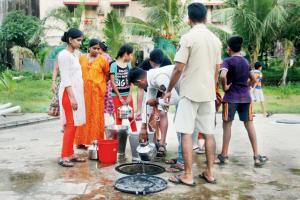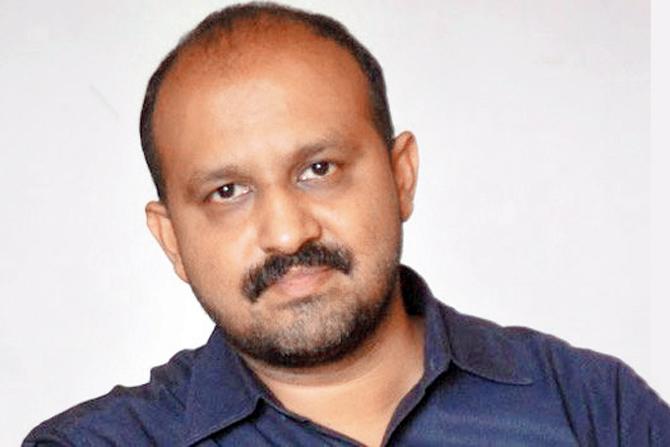Bucket Sundays, a save-water campaign by SUNDAY mid-day and Radio City, bring you a series on the city's water crisis. First up, activists, urbanists explain why water-cuts are far from the solution

Residents living in small settlements recognised by the government barely get 45 LPCD of water. Representational Image
Come summer, the BMC always reminds us of the looming water crisis in Mumbai. This is followed by phased water cuts, ranging from 10 to 15 per cent. It's a pattern that has now become routine to how the city functions. The argument is that Mumbai doesn't have enough water and most likely never will, unless we have good rainfall. But, is the city staring at a drought? If urban planners and activists are to be believed, not yet.
As SUNDAY mid-day kick-starts its 'Bucket Sundays' campaign, we spell out issues concerning water in the city and why aqua warriors, who are fighting the big fight to save every drop, feel we need to push the envelope when tackling the problem.
"The truth is that we are not facing a water crisis in Mumbai," says Sitaram Shelar, convenor of Pani Haq Samiti, a nine-year-old collective that is working towards equitable access to water. "Currently, 3,800 million litres per day (MLD) of purified water is being distributed to the city's 1.5 crore population. If you distribute it well, everyone will get 280 litres per capita per day (LPCD), which is almost double the national or international indicator," he adds.

Pankaj Joshi, UDRI
Shelar says that if we had a water problem, new housing projects wouldn't be receiving water connections and unlimited supply for their swimming pools. "There is ample water, but we are using it in an inhuman manner," he says. "People living in buildings are receiving 150 LPCD, while those living in small settlements recognised by the government barely get 45 LPCD [they comprise 60 per cent of the population]," he says. Poor distribution is observed in areas like Colaba, Reay Road, Byculla, as well as peripheries of Mankhurd, Govandi, Dahisar and Malad. "There is a new caste system based on water that is emerging in urban areas," says Shelar, whose collective in 2011 had filed a PIL in the Bombay High Court, challenging the state's Urban Development Department's decision of preventing 'unauthorised slums' from accessing municipal water supply. They won the case in 2014.
Pankaj Joshi, executive director of the Urban Design Research Institute, agrees with Shelar. "We actually have an adequate supply of water in the city. The fundamental problem is the inequitable distribution of water." Joshi believes that this abundance has made the city function "arrogantly". "We are consuming more and wasting a lot more.
Also read: Water crisis? Mumbai's stock lowest in three years
And, we don't even recycle 10 per cent of the water that we receive. There shouldn't be a situation where our urban poor, which is already starved of the resource, doesn't get water at all."
Shelar feels that the need of the hour is to create awareness among this 40 per cent of the city's population, which receives continuous supply. Octogenarian Aabid Surti, who runs the NGO Drop Dead Foundation, says that the municipality's decision of announcing 10 per cent water cut recently, is not a practical solution to the city's water problem. "Most homes waste 30 per cent water in leakages. If you correct the leakages, you do not have to cut water. In fact, you will get 30 per cent additional water. Reducing supply is just a short cut," he says, adding that households with nonstop supply should use the flush in their lavatories and shower sprinklers cautiously, as hundreds of litres of water are wasted daily in the process.
"We need to be austere in the way we use water," says Joshi, adding, "For starters, we shouldn't use drinking water for flushing or cleaning purposes. This can be resolved by dual-plumbing [a system of plumbing installations used to supply both potable and recycled or tube well water], and of course, being more careful about our consumption."
Also read: Elections 2019: No focus on water issues in poll manifestos, says activist Rajendra Singh
Catch up on all the latest Mumbai news, crime news, current affairs, and also a complete guide on Mumbai from food to things to do and events across the city here. Also download the new mid-day Android and iOS apps to get latest updates
 Subscribe today by clicking the link and stay updated with the latest news!" Click here!
Subscribe today by clicking the link and stay updated with the latest news!" Click here!









